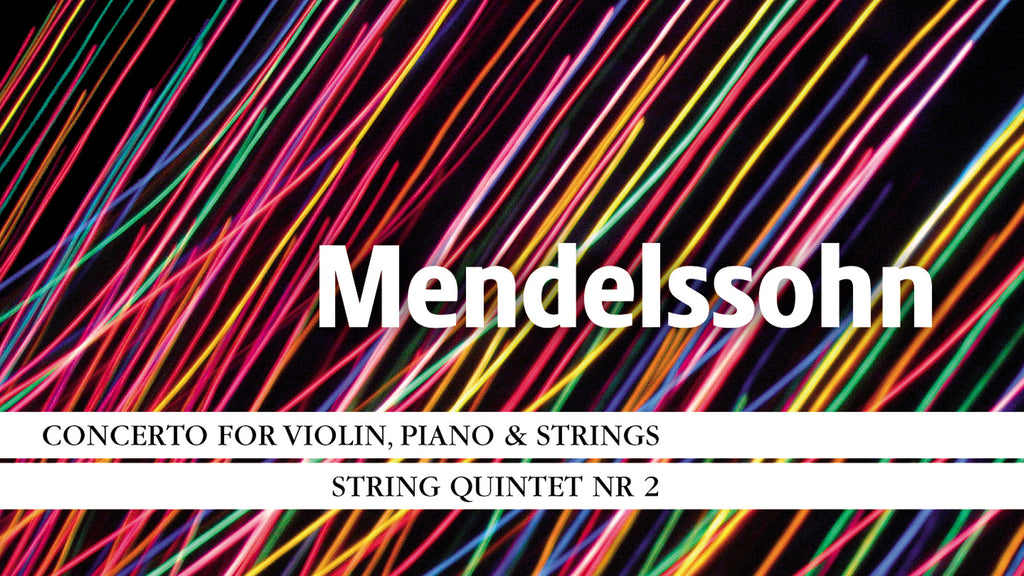
Music Web International: Felix Mendelssohn, Double Concerto for violin, piano and strings - Camerata Bern
Mendelssohn’s A Midsummer Night’s Dream Overture and String Octet are both widely regarded as works of youthful genius. Contained on these two releases are even earlier scores - the Concerto for piano and strings in A minor and the Double Concerto for violin, piano and strings in D minor from 1822/23. At this time the precociously talented Mendelssohn, then a mere fourteen years old, had already composed over a hundred scores including twelve String Symphonies. Mendelssohn intended that he would be able to perform the Double Concerto with his friend the violinist Edward Rietz and they did this in 1823 in front of sixty guests at a Sonntagsmusiken (Sunday musicales) at the Mendelssohn’s Berlin home. Mendelssohn’s early concertos, composed in a flurry of activity in the early 1820s, comprise: Concerto for piano and strings in A minor (1822); Concerto for violin in D minor (1822); Double Concerto for violin, piano and strings in D minor (1823); Concerto for two pianos in E major (1823) and Concerto for two pianos in A flat major (1824). Most likely because these concertos are from the pen of a young teenager they fell into oblivion for many years and are still often overlooked today. Yet, owing to Mendelssohn’s genius they contain many beautiful melodies, numerous fresh and novel ideas and will provide much pleasure.
The original scoring of the Double Concerto is the version that is performed here by the Freiburger Barockorchester. Commencing with a lengthy opening Allegro full of interest the excellent soloists perform with an impressive dialogue and awareness. Featuring an extended and charming unaccompanied duet for violin and fortepiano the attractive Adagio is given a satisfying performance so highly romantic in character. Creating a tempestuous feel the Freiburger Barockorchester take the Rondo, Finale at breakneck speed requiring real concentration and energy. Throughout the persuasive duo convey a real sense of engagement with the music.
Following that home-based private performance Mendelssohn felt inclined to re-score the Double Concerto by adding winds and timpani. Just over a week later the revision was performed at the Berlin Schauspielhaus. This version with winds and timpani was rediscovered among the Mendelssohn papers and this is what the Camerata Bern has chosen to perform. Claves state on the rear of the gatefold sleeve that this is the world première recording of the Double Concerto in the version with winds and timpani. There is beautiful playing from Weithaas and Lonquich in the extended opening Allegro. The violin is given a highly romantic feel more like a Brahms concerto than the classically inclined Mendelssohn. However, Weithaas is careful never to overdo the vibrato. In the Adagio with its substantial section for unaccompanied violin and piano the duo express an atmosphere of intense yearning. With unforced naturalness the prevailing mood is one of calm and relaxation. It would be hard to imagine a quicker tempo than that from the Camerata Bern in the Finale. The duo play with consistent charm and perception in a performance that exudes personality.
On Claves the Camerata Bern also perform the String Quintet No.2 composed in 1845 when Mendelssohn was thirty-six - only two years before his untimely death. Mendelssohn prepared a version for String Orchestra that Camerata Bern performs here. The Claves booklet notes state that this is its first recording. Breezy, fresh and very brisk playing opens the Allegro vivace movement with the slower central passages sustaining a tense undercurrent. The dance-like Andante scherzando is full of vivacity and charm contrasting nicely with the solemn and reverential tread of the Adagio e lento. I especially enjoyed the finale where there’s real energy and exhilaration.
The second score on the Harmonia Mundi disc from the Freiburger Barockorchester is the Concerto for piano and strings in A minor composed in 1822. Then only thirteen years old Mendelssohn had been inspired to write the score for his sister Fanny to play after hearing Hummel’s A minor Piano Concerto. Soloist Kristian Bezuidenhout..
Read the full article on Music Web International..
 Felix MENDELSSOHN (1809-1847)
Felix MENDELSSOHN (1809-1847)
Double Concerto for violin, piano and strings in D minor (version with winds and timpani) (1823) [35:07]
String Quintet No.2 in B flat major, Op.87 (version for string orchestra) (1845) [28:22]
![]() Antje Weithaas (violin)
Antje Weithaas (violin)
Alexander Lonquich (piano)
Camerata Bern
rec. 15-17 June 2010, Landgasthof, Riehen, Switzerland
![]() CLAVES RECORDS 50-1102 [63:41]
CLAVES RECORDS 50-1102 [63:41]
 Felix MENDELSSOHN (1809-1847)
Felix MENDELSSOHN (1809-1847)
Concerto for piano and strings in A minor (1822) [34:23]
Double Concerto for violin, piano and strings in D minor, (1823) [37:15]
![]() Kristian Bezuidenhout (fortepiano)
Kristian Bezuidenhout (fortepiano)
Freiburger Barockorchester/Gottfried von der Goltz (violin and direction)
rec. April 2010, Telex Studio, Berlin, Germany
![]() HARMONIA MUNDI HMC 902082 [71:40]
HARMONIA MUNDI HMC 902082 [71:40]
Article's source: Music Web International, Michael Cookson (2011)
Find this album here

Listen on Spotify
More articles about this Orchestra
Streaming / Download
iTunes: http://apple.co/1UfGvlP
GooglePlay: http://bit.ly/1YwuJTU
Qobuz: http://bit.ly/1Xt0sWW
Deezer: http://bit.ly/1PxzZjh
AmazonMp3: http://amzn.to/1PxA5Y3


Commentaires
0 Commentaires